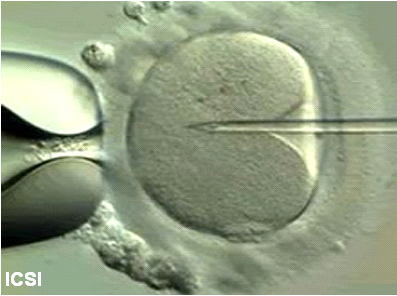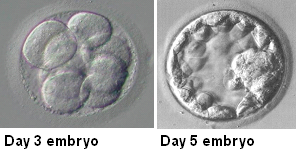
Intracytoplasmic sperm injection (ICSI) is very similar to IVF, except that a single sperm is injected directly into the egg rather than by simply mixing sperm and eggs. The fertilisation and pregnancy rates are similar for ICSI as they are for IVF. ICSI will generally be used in cases of poorer sperm quality or in other exceptional circumstances (e.g. when there has previously been poor fertilisation with IVF).

Embryo culture and transfer
All the culture processes for ICSI inseminated embryos are the same as for IVF once fertilisation is determined. Once embryos have been created in the laboratory, they will be cultured in small dishes in an incubator where they will undergo cell division. Embryos will be monitored whilst in culture. . Embryo transfer is usually performed on day 5 at the blastocyst stage. Around half of human embryos stop developing before they reach the compaction stage (approximately day 4), so one major advantage of culturing embryos for longer is that we can select the embryos that continue to develop and therefore have greater potential to develop into a pregnancy. As the blastocyst is a more complex structure, we can identify top quality embryos more reliably, as well as identify those which develop abnormally and have little chance of implanting.
Single embryo transfer
As top-quality blastocysts have a high chance of implanting, we would always aim to transfer only a single good quality blastocyst, to reduce the chance of a multiple pregnancy. This increases the chances of a safe and healthy pregnancy for both mother and child. We therefore encourage all of our patients to have an elective single embryo transfer as it is much safer to have a single baby rather than twins. The risk of twins is more than 20% of all pregnancies if two good quality embryos are transferred, so it is important to take this into account during discussions with your doctor. We would typically only offer a double embryo transfer in exceptional circumstances.
Embryo freezing
Any good quality embryos which have developed but not replaced can be frozen for use later, with your consent. This is an efficient process and the pregnancy rate using frozen-thawed embryos is very good. This is especially important when discussing issues around single embryo transfer.
You will be given detailed information on all aspects of your treatment before your treatment. There is also information on ICSI and blastocyst transfer – just ask our nursing staff.














